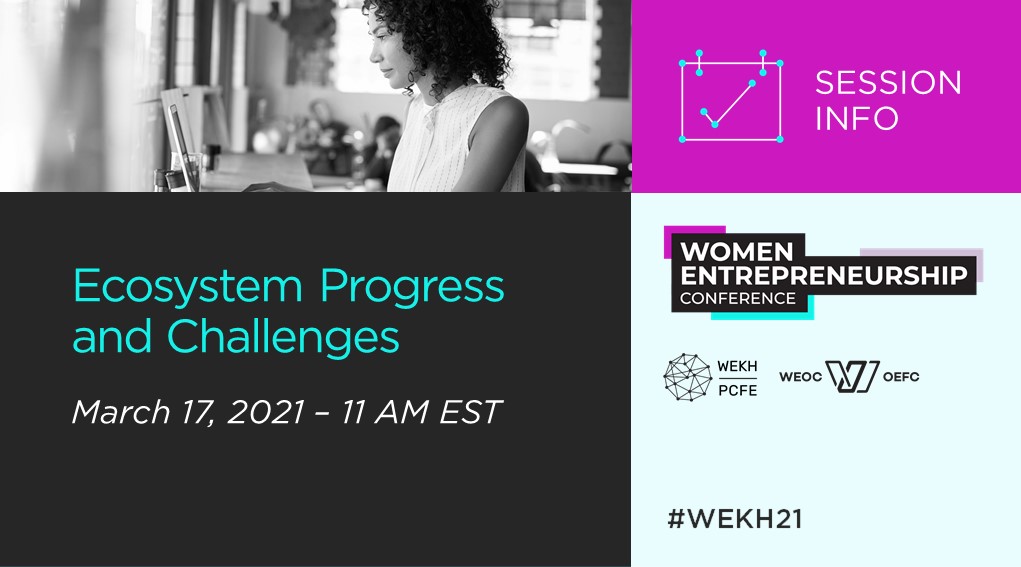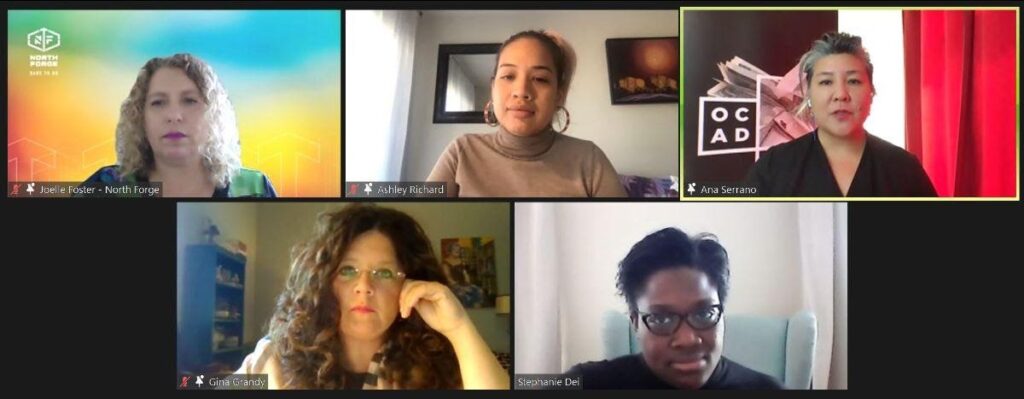Reviewing the Progress & Challenges of the Women’s Entrepreneurship Ecosystem

The women’s entrepreneurship ecosystem has changed tremendously since the Government of Canada first committed to supporting women entrepreneurs as part of their vision for the country’s future. More recently, the ecosystem was forced to adapt to a rapidly changing world as a result of the COVID-19 pandemic, and rushed in to advocate for and support women entrepreneurs disproportionately impacted during this difficult time.
A year into the pandemic, a timely conversation at the 2021 Women Entrepreneurship Conference—presented by the Women Entrepreneurship Knowledge Hub (WEKH) in partnership with Women’s Enterprise Organizations of Canada (WEOC)—reviewed the evolution of the ecosystem and the system women entrepreneurs work within, and asked the critical question: where do we go from here?

Wendy Cukier, Founder of the Diversity Institute and Academic Director at WEKH, explained that the federal government’s $5 billion Women Entrepreneurship Strategy, of which the Women Entrepreneurship Knowledge Hub is a part of, “whole-of-government” approach is essential as it informs governance in other areas as well.
But there is still much more that can be done.
“Even $5 billion is a small fraction of Canada’s overall investments in small business, in entrepreneurship, in innovation, in research and development. We have to make sure that women, especially diverse women, have their share of those other resources. That’s why we are very focused on looking at the ecosystem as a system, and trying to understand where the barriers are,” Cukier explained.
Deeply embedded cultural understandings of entrepreneurship, like stereotypes that devalue the contributions of women and privilege those made by men in tech, are one of those barriers. These stereotypes can push women away from entrepreneurship, and skew training programs, incubators and accelerators, and financing decisions towards men. WEKH’s See It. Be It. Database and campaign is working to crush these stereotypes by highlighting over 1,000 award-winning diverse women entrepreneurs in Canada.
“The fact is most of the system has been designed for men, by men, and has embedded in it many assumptions about what entrepreneurs are or should be,” Cukier said.
A Look at the Data
Douwere (Doure) Grekou, Chief of Dissemination & Census Subject Matter Secretariat at Statistics Canada, shared some of the latest data on individuals entering business ownership in Canada—illuminating the costly entrepreneurship gap and areas of concern that require additional attention, including:
- On a whole, women are traditionally less likely to incorporate their businesses. In 2016, women represented about a third of entrants into the ownership of incorporated private enterprises.
- 78% of women entrants were concentrated in the Services sector, Health and Social Assistance.
- Previous research has found that men entrants tend to have higher levels of prior experience in the field they are working within, which strongly correlates with key performance indicators like revenue and number of employees.
- Higher levels of prior industry experience increases labour-productivity, an effect that is even larger for women-owned enterprises.
This data has significant policy implications, Grekou explained. It shows that prior industry experience matters, and increasing said experience could greatly boost the outcomes of women entrepreneurs. Grekou recognized that more work is necessary, however, and the data provides causal insights but not the reasons why they occur.
Sandra Schillo, Associate Professor, University of Ottawa furthered the discussion with an analysis of entrepreneurship systems globally. Schillo considered data from the Global Entrepreneurship Monitor (GEM), consisting of 123,020 individual responses from entrepreneurs from 63 different countries, combined with key informants looking at enabling conditions in each country. System-level factors affect the start-up intentions and entrepreneurial readiness of individuals within their respective countries. These system-level factors include regulations, innovation supports, entrepreneurial education, and media attention on entrepreneurs and entrepreneurship within a given country.
“We were able to show that the environmental factors, the ecosystem that is around entrepreneurs, actually does make a difference” in the start-up intentions of individuals, Schillo explained. Not only are there differences for women, she noted but there is also value in looking at the entrepreneurship ecosystem through Indigenous knowledge and ways of knowing.” A major focus of the Women Entrepreneurship Knowledge Hub is mapping the innovation and entrepreneurship ecosystem and analysing the components through a gender and diversity lens.
“Nothing for us, about us, without us.”
Following the research presentations, Stephanie Dei, Director of Research Partnerships at the Diversity Institute, led a rich discussion with leaders in the women entrepreneurship ecosystem. Dei began the panel by asking which barriers they see continuing to present challenges for women entrepreneurs.

Gina Grandy, Professor and Dean for the Hill and Levene Schools of Business at the University of Regina, reflected on her work to better understand women entrepreneurs in agriculture and farming. A significant barrier that these women face, Grandy explained, is insufficient access to adequate and affordable childcare. Working hours for these women often conflict with typical childcare hours, yet they continue to carry much of the burden of childcare, as well as family and elder care. “Those who have been successful continually talk about how they have had more access to childcare in the ecosystem, or their family situation is different whereby their partners are participating more fully or sharing that responsibility,” Grandy explained.
For Joelle Foster, CEO of North Forge Technology Exchange, reliable and affordable access to the internet is another significant barrier, especially for women in rural communities. Foster recognized that the government has committed to increasing access across Canada, but stressed that the need is urgent and pressing, especially as a result of the COVID-19 andemic. “Internet is not a luxury; it is a necessity…Women without reliable internet access are being left behind,” Foster said.
It is important to meet women entrepreneurs where they are, and develop a deep understanding of their needs in order to properly support them, explained Ana Serrano, President & Vice Chancellor of OCAD University. While the shifting boundaries between work and life seem to provide additional flexibility as many continue to work from home, for instance, it is also resulting in added anxiety for women, Serrano added.
At the same time, the pandemic has uncovered new opportunities for women entrepreneurs and the organizations that support them. Grandy explained that the shift online at the outset of the COVID-19 pandemic extended resources to more entrepreneurs. Foster noted that while North Forge is in Winnipeg, it has seen a significant increase in interest from rural Manitoba during the pandemic.
While some Indigneous entrepreneurs have benefited from the increased availability of programs and services online, many continue to face significant barriers to their participation. Ashley Richard, Outreach and Partnership Development Lead Indigenous at WEKH, explained that the increase of remote work and online schooling requires multiple, expensive connected devices and the broadband capacity to accommodate them. As the necessary investments in infrastructure lags, especially in rural and remote communities, and hardware and software costs remain high, Indigenous entrepreneurs risk being left behind as more work, schooling, and business takes place online than ever before.
Looking forward, panelists emphasized that efforts to advance women entrepreneurship in Canada must be intersectional, recognizing the incredible diversity of women entrepreneurs, and led by women themselves and the communities most affected. Richard summed it up clearly: “Nothing for us, about us, without us.”
Watch the webinar on-demand to hear more from our presenters and panelists
Connect with WEKH
Connect with WEKH on Twitter, LinkedIn, Facebook and Instagram—and subscribe to our mailing list—for all the latest news and updates from the women entrepreneurship ecosystem.
